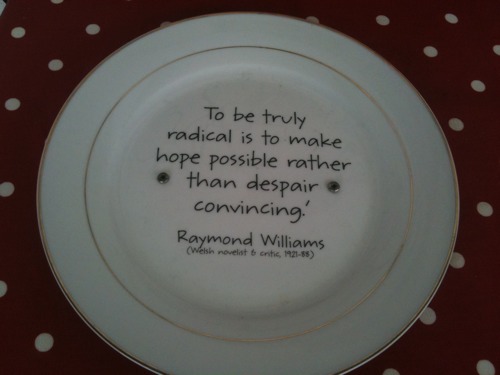When Tolstory penned the line above, I doubt he imagined it would resonate so much in the 21st Century. Similarly, when Mahatma Gandhi said:
“Be the change that you wish to see in the world.”
he was expressing the same feeling. Margaret Mead, whom I’ve quoted before, gave it ultimate clarity:
“Never doubt that a small group of thoughtful, committed, citizens can change the world. Indeed, it is the only thing that ever has.”
In all three examples, there is an expressed or implied need for change in the world and while Gandhi may have been passive in his protest, in his words he was describing a need to be anything but passive. When they come at you with sticks and stones, with accusations and name-calling, it’s important to weather it with stoicism and not become involved in the affray. Tolstory described the need to change yourself to fit the world you want. And Mead made it plain – change doesn’t happen because a nation decided that enough was enough. Change happens because a small group of people have a vision of the future and decide to work towards it.
That’s the very essence of #freshpolitics
“Political consensus still has to be spelled out, emphasised and underlined several times before anything is done. Yet despite the territoriality and suspicion that persists in many parts of the city, progress continues to be made.”
The quote above by Julian Dobson after his visit to the “Belfast Future City” conference is preceded by descriptions of how fragile everything is. We are not yet living in the shared future, but there are pockets of people who want to be.
I do not doubt that our politicians mostly want to change the world for the better. But to remain in office means getting votes and to get votes you have to stop other people getting into office. And it’s much easier to incite than it is to inspire. We’ve suffered a stalemate for fifteen years because our political elite have to maintain a status quo.
I am not a political animal by nature. I’ve never joined a political party, I wasn’t interested in politics in University (when most young men seem to be radicalised for good or ill). I was more interested in hard work, hard play and the limits of my imagination (which I have yet to fully plumb). I participated in the Internet then, part of an inevitable global village and spoke daily to people all around the world, from different walks of life. And while I have had the chance to live in other places, I have always considered Northern Ireland my home and I consciously decided not to leave. After all, in 1998, things were going to get better.
As a parent in Northern Ireland, it is our duty to help build the future for our children. It may not be a future that we are able to enjoy, but it should be one within which our children and their children can live fulfilling lives. We tell “little white lies” to children all the time – from “carrots help you see in the dark” to “Santa”, and we lie to ourselves on the same basis.
Greg Fraley reported this gem from IDEO:
We create the future by lying about it first
“Hope” is the biggest and most important lie we tell ourselves.
We have a fragile, divided society, but we talk about a future that is shared by all. We may not have realised the potential of our city, but we can draw you a picture of how we want it to look. We are a small group of committed individuals but we describe ourselves as legion.
That’s what #freshpolitics is about.

Raymond Williams. Fantastic. A key thinker. I’m just about to start reading his The Country and the City as I look for a few fresh perspectives on how to think about Northern Ireland.
I’m open to the idea of #freshpolitics and a shared future. I think that’s worth saying because there are plenty of people in Northern Ireland who profess their dedication to a shared future but actually their ambitions and actions show that they are committed to (and have vested interest in) the continuation of the old politics and community division. The flags dispute is a perfect illustration this. But it also highlighted the limits of the thinking of those others who say they want to see a shared future.
A genuinely shared future has to go further than trying to pacify those troublesome ‘Prods and Taigs’ and actually tackle the social and economic divisions that underscore sectarian conflict.
To do that we need to abandon the economic model that prevails at the moment. We need to move to a model that is redistributive and sustainable. What we have at the moment produces extraordinary inequality and that inequality leaves historically antagonistic communities competing for diminishing resources. That is a recipe for violent conflict.
The only party Northern Ireland Assembly that seems to speak to these issues is the Green Party. There are other smaller parties outside of the mainstream but too much of our public debate revolves around how to ‘open’ Northern Ireland for divisive version of business without any reflection upon the consequences for that.
I’m not surprised you only find this in the Greens at the moment – they are the only post-conflict party at the moment.
No coincidence and not without issues.
11 months later and my comment is now outdated. There’s not only an additional post-conflict party in Northern Ireland (NI21) but I’m standing as a councillor for them in my home constituency of North Down and Ards.